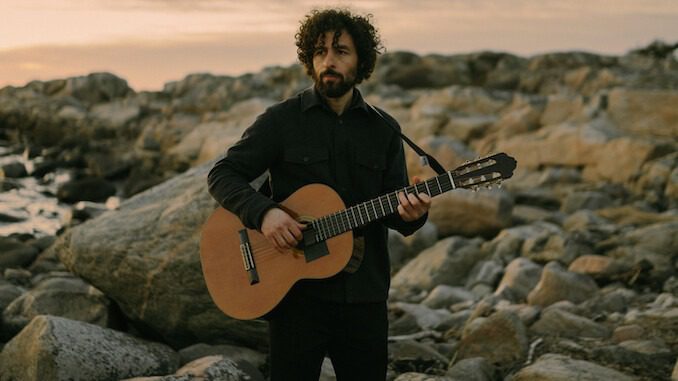When José González exercises, he counts reps in Spanish. “It’s like the reptile brain is being programmed,” he jokes on a recent video chat in English, while wandering through the streets of his native Gothenburg, Sweden.
Though he works out in Spanish and talks to his kids in Swedish, González had always written songs in English—until now. Local Valley, the Argentinian-Swedish singer and songwriter’s fourth solo album, continues in the understated, almost dreamy folk-rock vein as his earlier work. It also marks the first time that González has released songs in all three of the languages he speaks.
He credits becoming a father with broadening his linguistic approach to songwriting. The 2017 arrival of his daughter made him ask himself a lot of existential questions, González says. “You get the chance to affect your child with what you do, what you say. And that made me think of who I am and who I want to be as an artist.”
Thanks to Argentine parents who had moved to Sweden before he was born, Spanish was the first language González spoke as a child growing up in Gothenburg, where he soon learned Swedish and, eventually, English. Yet though he counts Spanish and Swedish as “mother tongues,” he was most comfortable writing in English. “I was a teenager when I started writing my first lyrics,” says González. “At the time, I was learning to play through Latin American artists, but I think I was doing what all my friends were doing, and it was basically just writing in English.”
The idea of writing in Swedish or Spanish felt foreign to him at the time. “Those two languages were too direct and too close to me, and it was nice to have that distance, the veneer,” González says. “I could hide behind this other language, which felt more enigmatic.”
González was soon touring frequently enough in the United Kingdom and North America on his own and as half of the Swedish folk-rock band Junip, with Tobias Winterkorn, that English lost some of its mystique. He even started writing songs in other languages for his 2015 solo album, Vestiges & Claws, an effort that soon lost steam. “I sort of wrote half of a song in Spanish, another one in Swedish, but got stuck and switched to English,” he says. “I guess I was a bit lazy.”
That wasn’t an issue on Local Valley. When the options for which language to write in expanded, the sound and feel of descriptions and vocabulary in different idioms become essential parts of the songs. On opener “El Invento,” for example, González delivers Spanish lyrics that address the wonderment of existence: “Dime por qué será / Dime por dónde vas / Dime de dónde somos,” he sings on the refrain (in English: “Tell me why is it so / Tell me where are you headed / Tell me where are we from”), sounding almost lost in a reverie as he accompanies himself with a soft, fluid fingerpicked guitar. “I was going for something poetical [sic],” González says. “And also giving some sort of homage, or a nod, to my early influences like Silvio Rodríguez.”
“Tjomme,” by contrast, is more about provocation than wonderment. The title is Gothenburg slang for “dude,” and the Swedish lyrics address people who blindly follow what González calls “doomsday dudes”—people who are deeply certain, and dogmatic, about things they have no real way of knowing for sure. “Can’t dare to think for yourself / Rely blindly on old text,” González sings in translation, in what would qualify as scoffing if he didn’t sound so amiable as he murmurs through a sinewy arrangement of acoustic guitar and a programmed drum beat.
“It’s very direct and I felt like, OK, let’s choose Swedish for that type of lyric,” he says.
Though there’s definitely a pandemic application to the doomsday-dude sentiment, given the dismaying number of people “doing their research” online about Covid vaccines and choosing horse dewormer instead, González was mostly finished writing the songs in February 2019, before the scope of the coronavirus had come fully into focus. It soon became clear that González could take his time recording the songs, which harked back to his more leisurely approach to recording before he had kids.
“There wasn’t a rush to finish the album and I spent many months of the pandemic producing and polishing many of the songs,” he says. “That was a good opening for me to take the time to make the album that I really want to make and not settle with the first versions.”
Instead of relying on “more of the arpeggios and just one guitar,” he used a drum machine on some tracks to add rhythm, and tape loops to create multiple parts, which he also does with pedals onstage to fill out the sound when he performs solo. Just one guitar is plenty on “Valle Local,” where González sings in Spanish over a swift, thrumming part influenced in part by a jam session he had with the Nigerien singer and guitarist Bombino.
“‘Valle Local’ was a bit inspired by how musicians from Mali or Niger,sing in their native tongues instead of French, for example,” González says.
That attention to detail, and the subtle yearning that often underpins González’s songs, has earned him a fair measure of critical acclaim, and also made him a sought-after collaborator. González has worked with the band Zero 7, the Finnish house DJ Jori Hulkkonen and classical musicians from Sweden and Germany. He also was a key piece of the musical score to Ben Stiller’s 2013 film The Secret Life of Walter Mitty, where González’s voice serves as a sort of interior monologue for Mitty.
“José ended up being the perfect collaborator,” Walter Mitty composer Theodore Shapiro told The Wall Street Journal in 2013. “His voice and his guitar are really the featured instruments for this score, and as a result of that, I feel like there’s really a seamlessness between the score and the songs used in the movie.”
For González, it’s just one more way to communicate. As for spoken languages, it’s likely that Local Valley won’t be the last time he sings in Spanish or Swedish. “Now I feel like I’m revealing myself in all three languages,” he says. “So the reason why I choose different languages on my songs, it’s a gut feeling.”
Eric R. Danton has been contributing to Paste since 2013, and writing about music and pop culture for longer than he cares to admit. Follow him on Twitter or visit his website.




